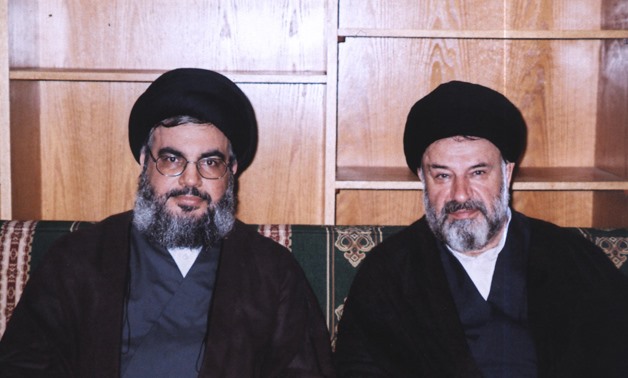
Hassan Nasr allh - Creative Commons Via Wikimedia
BEIRUT - 2 June 2017: Moves in Washington to widen financial sanctions on the powerful Shi'ite Hezbollah political group have triggered alarm in Beirut where the government fears major damage to the banking sector that underpins Lebanon's stability.
Not yet proposed as law, draft amendments to an existing law threatening sanctions against anyone who finances the heavily-armed Iranian-backed Hezbollah in a significant way prompted lobbying trips to Washington in May by worried Lebanese bankers and politicians.
They returned saying that U.S. officials recognised their concerns over draft proposals that would widen the scope of the law by subjecting Hezbollah's political allies to sanctions or scrutiny, and believing any expansion of the law would be a toned down version of the draft.
But with U.S. President Donald Trump keen to curb the influence of Iran and its Middle Eastern allies in the region, the risks have not gone away for Lebanon, where Hezbollah wields huge influence.
"There's one question anyone who wants to put pressure on Lebanon should remember: Do you want another failed state on the eastern Mediterranean?" Yassine Jaber, a member of parliament who led a delegation to Washington in mid-May, told Reuters.
"Lebanon is very, very vulnerable economically at the moment," added Jaber, an independent Shi'ite politician who is aligned with Parliament Speaker Nabih Berri's Shi'ite Amal movement, which was named as a target for investigation in the draft amendments first reported by Lebanese media in April.
Political and financial figures fear more regulatory pressure could damage the banking sector - the cornerstone of Lebanon's precarious economy - endangering a financial stability maintained despite the war in neighbouring Syria where Hezbollah along with Iran backs President Bashar al-Assad.
Hezbollah, led by Sayyed Hassan Nasrallah, was formed to combat Israel's 1982-2000 occupation of Lebanon. Its battlefield prowess, extensive social works among Lebanese Shi'ites and its alliance with powerful regional states have helped it secure a dominant role in the country's politics with seats in parliament and government. It is classified by Washington as a terrorist organisation.
MAIN WORRY CORRESPONDENT BANKS
The main worry is that U.S. correspondent banks - which face huge fines if found to be dealing with people or companies sanctioned under anti-terrorism financing legislation - might finally decide Lebanese banks are too risky to do business with.
That would threaten the remittances upon which the highly dollarised Lebanese economy depends. Shortly after the Lebanese press published the draft, President Michel Aoun - a Maronite Christian and political ally of Hezbollah - said as it stands it could cause "great damage to Lebanon and its people".
The draft proposal would widen legislation to include persons and entities affiliated with Hezbollah, and to report on the finances of senior members of Amal. The wording gave rise to speculation in Lebanon that Aoun's finances could be also targeted for scrutiny.
Jaber told Reuters the draft - a copy of which was seen by Reuters - was now "outdated".
But sources familiar with the matter told Reuters there remains a strong desire in Washington to press harder against Iran and Hezbollah, and there are likely other measures being drafted.
A U.S. congressional aide told Reuters that Republican representative and head of the U.S. Foreign Affairs Committee Ed Royce, who authored the original 2015 law, is considering additional legislation.
"If they (the banks) aren't doing business with Hezbollah, they don't have anything to worry about," the aide said.
The U.S. Treasury declined to comment on the draft saying it had no formal position.
Jaber said: "The position at the moment is that there might be some congressmen or senators thinking of preparing a bill, but I think our discussions will help in toning it down from what we saw as a draft."
The United States says Hezbollah is financed not just by Iran but also by networks of Lebanese and international individuals and businesses. The 2015 law, known as HIFPA, aimed to cut off these funding routes.
TRIGGERED TENSIONS
Its implementation triggered domestic tensions in Lebanon. Worried about losing their relationship with correspondent banks, Lebanese banks began closing some customers' accounts, including Shi'ites who were not Hezbollah members.
Critics of the law in Lebanon say it resulted in the unfair targeting of the Shi'ite population. Charity networks run by Shi'ite clerics were hit when some of their accounts closed for a time.
The law led to an unprecedented dispute between Hezbollah and the central bank which asked all banks to comply with the legislation. Last June, a bomb was set off at the headquarters of leading Lebanese bank Blom Bank, causing no casualties.
Since taking office in January, Trump has imposed new sanctions on individuals and businesses involved with Iran's ballistic missile programme and with Hezbollah.
Ali Hamdan, an Amal member who went on the lobbying trip to Washington, echoed Jaber, saying the leaked draft was outdated and could be forgotten. "An understanding was reached," said Hamdan, media adviser to Berri. " told them: more, wider, generalised sanctions are a recipe to destroy Lebanon."
The Association of Banks in Lebanon (ABL) dispatched its own delegation in May and met with a "good response" in Washington and from U.S. correspondent banks in New York.
ABL head Joseph Torbey made the case that existing legislation was sufficient and that the new draft was open to "inappropriate interpretations".

Comments
Leave a Comment